Related Research Articles

The Philippines, officially the Republic of the Philippines, is an archipelagic country in Southeast Asia. It is situated in the western Pacific Ocean, and consists of about 7,640 islands, that are broadly categorized under three main geographical divisions from north to south: Luzon, Visayas, and Mindanao. The Philippines is bounded by the West Philippine Sea to the west, the Philippine Sea to the east, and the Celebes Sea to the southwest, and shares maritime borders with Taiwan to the north, Japan to the northeast, Palau to the east and southeast, Indonesia to the south, Malaysia to the southwest, Vietnam to the west, and China to the northwest. The Philippines covers an area of 300,000 km2 (120,000 sq mi) and, as of 2020, had a population of around 109 million people, making it the world's twelfth-most populous country. The Philippines is a multinational state, with diverse ethnicities and cultures throughout its islands. Manila is the nation's capital, while the largest city is Quezon City, both lying within the urban area of Metro Manila.

Metropolitan Manila, officially the National Capital Region, is the seat of government and one of three defined metropolitan areas in the Philippines. It is composed of 16 cities: the city of Manila, Quezon City, Caloocan, Las Piñas, Makati, Malabon, Mandaluyong, Marikina, Muntinlupa, Navotas, Parañaque, Pasay, Pasig, San Juan, Taguig, and Valenzuela, as well as the municipality of Pateros. The region encompasses an area of 619.57 square kilometers (239.22 sq mi) and a population of 13,484,462 as of 2020. It is the second most populous and the most densely populated region of the Philippines. It is also the 9th most populous metropolitan area in Asia and the 5th most populous urban area in the world.
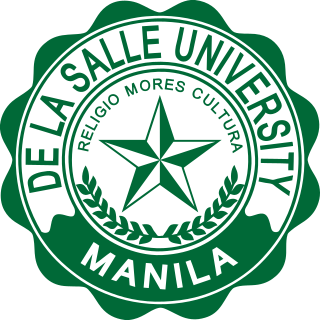
De La Salle University, also referred to as DLSU, De La Salle or La Salle, is a private, Catholic coeducational research university run by the Institute of the Brothers of the Christian Schools in Taft Avenue, Malate, Manila, Philippines. It was established by the Christian Brothers in 1911 as the De La Salle College (DLSC) in Nozaleda Street, Paco, Manila with Blimond Pierre Eilenbecker, FSC serving as director, and is the first De La Salle school in the Philippines. The institution moved to its present location in 1921. The college was granted university status on February 19, 1975, and is the oldest constituent of De La Salle Philippines (DLSP), a network of 16 educational institutions, established in 2006 replacing the De La Salle University System.

The Ateneo de Manila University, also known simply as the Ateneo de Manila, the Ateneo, or AdMU, is a private, research, basic and higher education institution founded and run by the Society of Jesus in Quezon City, Philippines. Founded in 1859 as Escuela Municipal de Manila, it is the second-oldest Jesuit-administered institution of higher learning in Asia-Pacific.

The University of Santo Tomas is a private, Catholic research university in Manila, Philippines. Founded on April 28, 1611, by Spanish friar Miguel de Benavides, third Archbishop of Manila, it has the oldest extant university charter in the Philippines and in Asia, and is one of the world's largest Catholic universities in terms of enrollment found on one campus. It is the main campus of the University of Santo Tomas System that is run by the Order of Preachers.
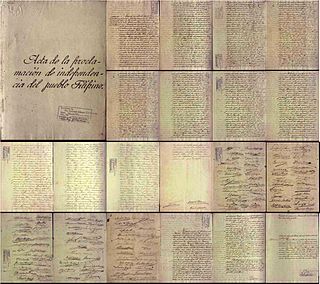
Spanish was the official language of the Philippines from the beginning of Spanish rule in the late 16th century, until sometime during the Philippine–American War (1899-1902) and remained co-official, along with English, until 1973. It was at first removed in 1973 by a constitutional change, but after a few months it was re-designated an official language by presidential decree. With the present Constitution Spanish was recognized as an auxiliary or "optional and voluntary language".
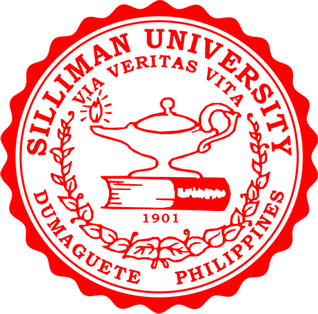
Silliman University is a private research university in Dumaguete City, Negros Oriental, the Philippines. Established in 1901 as Silliman Institute by the Presbyterian Board of Foreign Missions, it is the first American and Protestant founded institution of higher learning in the Philippines and in Asia.

The University of San Carlos, also referred to by its acronym USC or colloquially shortened to San Carlos, is a private, Catholic, research, coeducational basic and higher education institution administered by the Philippine Southern Province of the Society of the Divine Word (SVD) missionaries in Cebu City, Philippines since 1935. It offers basic education and higher education. Founded originally in 1595 as Colegio de San Ildefonso, it later became the Colegio-Seminario de San Carlos in 1783 and finally obtained university charter in 1948.
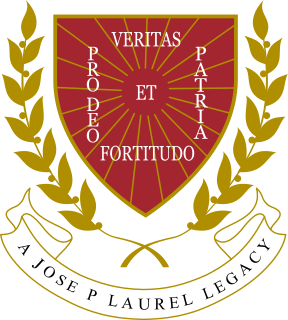
Lyceum of the Philippines University is a private university located at intramuros in the City of Manila, Philippines. It was founded in 1952 by Dr. José P. Laurel, who was the third president of the Republic of the Philippines.

The Central Philippine University is a private research university in Iloilo City, Philippines. Established in 1905 through a benevolent grant of the American industrialist and philanthropist, John D. Rockefeller, as the Jaro Industrial School and Bible School under the auspices of the American Baptist Foreign Mission Society, it is the first Baptist founded and second American and Protestant university in the Philippines and in Asia. In 1913, women were first admitted to the school and it was later converted into a junior college in 1923 as Central Philippine School and as Central Philippine College in 1924. In 1953, the college attained university status.

FEATI University is a private non-sectarian co-educational higher education institution with a Catholic orientation established in 1946 in Santa Cruz, Manila, Philippines. FEATI was formerly known as the Far Eastern Aeronautics School.
Education in the Philippines is provided by public and private schools, colleges, universities, and technical and vocational institutions in the country. Funding for public education comes from the national government. For the academic year 2017–2018, about 83% of K–12 students attended public schools and about 17% either attended private schools or were home-schooled.

Trinity University of Asia, also known as TUA or simply Trinity, is a non-sectarian private university located in Quezon City, Philippines. Formally established in 1963 as an elementary, high school and collegiate educational institution by the Protestant Episcopalians, it dates back its earliest establishment in 1907 when the Trinity University of Asia - St. Luke's College of Nursing, its oldest organic academic unit, was established under the St. Luke's Hospital, the present day St. Luke's Medical Center. It later acquired its university status on July 18, 2006.

Arellano University (AU) is a private, coeducational, nonsectarian university located in Manila, the Philippines. It was founded in 1938 as a law school by Florentino Cayco, Sr., the first Filipino Undersecretary of Public Instruction. The university was named after Cayetano Arellano, the first Chief Justice of the Supreme Court of the Philippines. It operates seven campuses located throughout Metro Manila and the main campus is located along Legarda Street, Sampaloc, Manila. The Arellano University School of Law is autonomous and managed by the Arellano Law Foundation. Its athletic team, the Arellano University Chiefs, is a member of the National Collegiate Athletic Association since 2009.

The Philippine Normal University is a public coeducational teacher education and research university in the Philippines. It was established in 1901 through Act No. 74 of the Philippine Commission "for the education of natives of the Islands in the science of teaching". It has campuses in Manila, North Luzon, South Luzon, Visayas, and Mindanao. Pursuant to Republic Act No. 9647, it is the country's National Center for Teacher Education.
Legal education in the Philippines is developed and offered by Philippine law schools, supervised by the Legal Education Board. Previously, the Commission on Higher Education supervises the legal education in the Philippines but was replaced by the Legal Education Board since 1993 after the enactment of Republic Act No. 7662 or the Legal Education Reform Act of 1993.
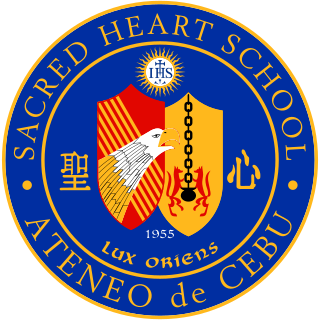
Sacred Heart School – Ateneo de Cebu (SHS-AdC), formerly known as Sacred Heart School for Boys (SHS-B), is a private, Catholic, Chinese-Filipino college-preparatory, K-12 school run by the Philippine Province of the Society of Jesus in Mandaue City, Philippines. It was established in 1955 with a curriculum that includes a Chinese language course.
The higher education in the Philippines is offered through various degree programs by a wide selection of colleges and universities—also known as higher education institutions (HEIs). These are administered and regulated by the Commission on Higher Education (CHED).

During the Spanish colonial period in the Philippines (1521–1898), the different cultures of the archipelago experienced a gradual unification from a variety of native Asian and Islamic customs and traditions, including animist religious practices, to what is known today as Filipino culture, a unique hybrid of Southeast Asian and Western culture, namely Spanish, including the Spanish language and the Catholic faith.

The history of De La Salle University dates back to 1911, when the Christian Brothers opened the De La Salle College (DLSC) in Nozaleda Street, Paco, Manila, Philippines. It is the first La Salle school established by the Christian Brothers in the Philippines, and the oldest constituent of De La Salle Philippines (DLSP), a network of 16 Lasallian educational institutions established in 2006 replacing the De La Salle University System.
References
- ↑ Hernandez, Vicente (1996). "The Spanish Colonial Library Institutions". Philippine Studies. 44 (3): 321–348.
- ↑ Cruz, Isagani R. (1997). Building a Nation: Private Education in the Philippines. Makati: Fund for Assistance to Private Education. p. 48. ISBN 971-8766-03-0.
- "The First University". The Philippine Star. December 17, 2009. Archived from the original on August 22, 2010. Retrieved August 22, 2010.